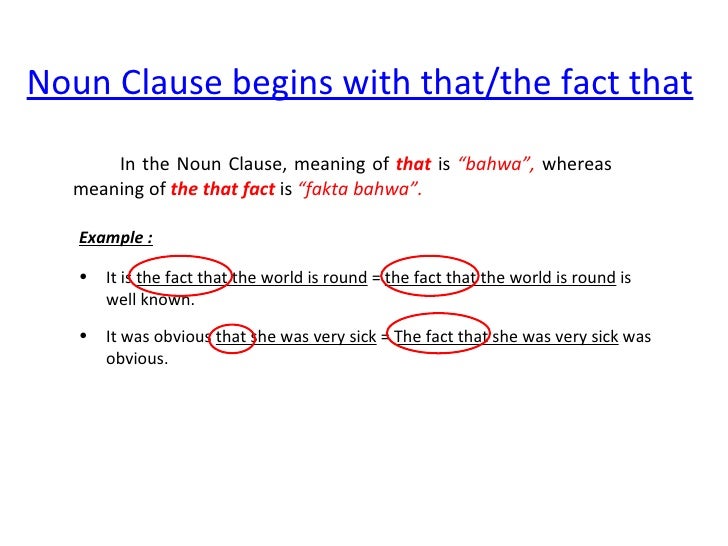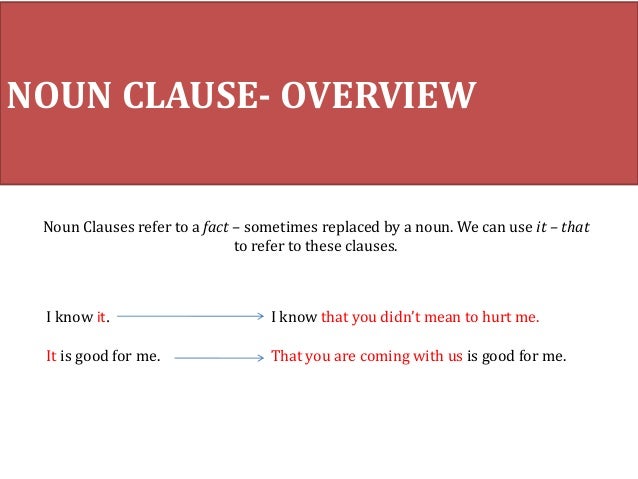What Is Noun Clause : Grammar : Clauses: Noun Clause Patterns : As you know, a clause contains a subject and a predicate of its own.
What Is Noun Clause : Grammar : Clauses: Noun Clause Patterns : As you know, a clause contains a subject and a predicate of its own.. Noun examples a noun is a part of speech that names a person, place, thing, idea, action or quality. I believe that he is innocent. A noun serves as the subject of the verb in a sentence or it serves as the complement of the verb in a sentence ; So does a noun clause and even a nominal or. It has no physical existence.
So does a noun clause and even a nominal or. A concrete noun is the exact opposite of. Truth, lies, happiness, sorrow, time, friendship, humor, patriotism, etc. In addition to nouns and pronouns , noun clauses also perform the grammatical function of direct object. A noun serves as the subject of the verb in a sentence or it serves as the complement of the verb in a sentence ;

Generally, it refers to ideas, qualities, and conditions.
It has no physical existence. An abstract noun is a word for something that cannot be seen but is there. Jan 27, 2019 · a noun clause has to do with the beta clause, which we also call a dependent or subordinate clause which performs the function of a noun in a sentence or functions like the nominal group. As you know, a clause contains a subject and a predicate of its own. What i had forgotten was that i had a test today. A noun clause is a dependent clause that acts as a noun. In addition to nouns and pronouns , noun clauses also perform the grammatical function of direct object. A concrete noun is the exact opposite of. That she has won the prize surprised me. Generally, it refers to ideas, qualities, and conditions. It can be used as the subject, direct object, indirect object, object of a preposition, subject complement, or appositive. A noun serves as the subject of the verb in a sentence or it serves as the complement of the verb in a sentence ; An example is given below.
It can be used as the subject, direct object, indirect object, object of a preposition, subject complement, or appositive. You must choose which flavor of ice cream you want. It has no physical existence. A noun serves as the subject of the verb in a sentence or it serves as the complement of the verb in a sentence ; Usually begins with how, that, what, whatever, when, where, which, whichever, who, whom, whoever, whose, or why.

In addition to nouns and pronouns , noun clauses also perform the grammatical function of direct object.
I believe that he is innocent. All nouns can be classified into two groups of nouns: That she has won the prize surprised me. In addition to nouns and pronouns , noun clauses also perform the grammatical function of direct object. As you know, a clause contains a subject and a predicate of its own. An example is given below. A noun clause is a dependent clause that acts as a noun. In grammar, a direct object is a word, phrase, or clause that follows and receives the action of a transitive verb. You must choose which flavor of ice cream you want. So does a noun clause and even a nominal or. It can be used as the subject, direct object, indirect object, object of a preposition, subject complement, or appositive. May 15, 2014 · a noun clause is a group of words which does the work of a noun. It has no physical existence.
In grammar, a direct object is a word, phrase, or clause that follows and receives the action of a transitive verb. Generally, it refers to ideas, qualities, and conditions. A noun clause is a dependent clause that acts as a noun. A noun serves as the subject of the verb in a sentence or it serves as the complement of the verb in a sentence ; All nouns can be classified into two groups of nouns:

May 15, 2014 · a noun clause is a group of words which does the work of a noun.
Jan 27, 2019 · a noun clause has to do with the beta clause, which we also call a dependent or subordinate clause which performs the function of a noun in a sentence or functions like the nominal group. So does a noun clause and even a nominal or. In grammar, a direct object is a word, phrase, or clause that follows and receives the action of a transitive verb. A concrete noun is the exact opposite of. It can be used as the subject, direct object, indirect object, object of a preposition, subject complement, or appositive. What i had forgotten was that i had a test today. Abstract noun examples in sentences. A noun clause is a dependent clause that acts as a noun. That she has won the prize surprised me. It can be the subject or the object of the verb. You must choose which flavor of ice cream you want. A noun serves as the subject of the verb in a sentence or it serves as the complement of the verb in a sentence ; All nouns can be classified into two groups of nouns: